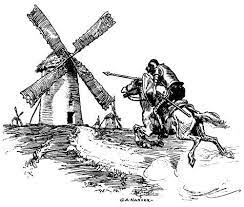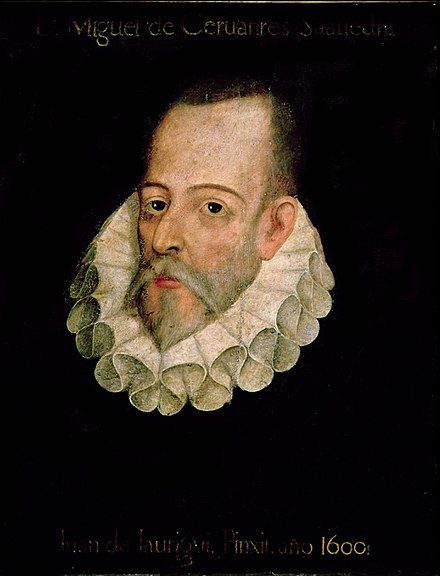Miquel de Cervantes Saavedra was born today, the 29th of September, in 1547.
Or, at least people concerned with these matters, are pretty sure that’s the date. Actually we’re not even certain that was his name. Maybe it was Cerbantes.
Maybe he was a New Christian. Or, possibly not. His father was a barber/surgeon. The family moved a lot, and for some period of time his father was in debtor’s prison, and support for the family fell to his mother, Leonor.
Cervantes seems to have received a Jesuit education. He appears to have gotten involved in a duel, and fled Madrid. He lived for a time in Rome.
Later he received a military commission with the Crown of Aragon army, and fought against the Ottomans. He served with valor and was raised in rank several times. He was wounded, apparently several times, and would carry the consequences of those wounds for the rest of his life.
After his service Cervantes and his brother were captured by Ottoman pirates and held for ransom. His brother was ransomed, but the family was unable to raise the demand for Cervantes. After five years he was ransomed by a charity.
He appears to have worked briefly as a spy. And whatever else might earn a few dollars (or the local equivalent).
Cervantes had an illegitimate daughter before he married. Worked for a time as a tax collector. And had his own brief stints in prison. Finally after years of wanderings he settled in Madrid, dying there in 1616.
He turned his hand to writing earlier in his life, claiming to have penned some twenty plays, and one romance novel. It’s also noted he was an unreliable reporter about the events of his life.
However. there is that one thing. In 1605 that El ingenious hidalgo Don Quijote de la Mancha was first published.
 As one wag summarized the plot, “Guy attacks windmills. Also, he’s mad.”
As one wag summarized the plot, “Guy attacks windmills. Also, he’s mad.”
Cervantes claimed the novel was not a novel but a document he stumbled upon largely translated from an Arabic account of Quixote, driven mad by reading stories of chivalry, and who decides to become a knight-errant. He quickly recruits the farmer Sancho Panza as his squire. And off they go.
The rest, as they say…
The novel was an instant success. And it was quickly translated into French, Italian, German, and English. The first of the English versions was Thomas Shelton’s, the first part published as The delightful history of the wittie knight, Don Quiskote in 1612.
I don’t think the novel has ever been out of print.
(As a small aside Wikipedia recounts among the many English language translations, one by John Milton’s nephew, John Phillips, which some, including the contemporary translator Samuel Putnam, consider the worst English version of all time. A worthy achievement, no doubt.)
(Another aside provided by Wikipedia is that the now well worn phrase “the proof of the pudding is in the eating” was cooked up by another translator Pierre Antoine Motteux, reworking Cervantes’ original “you will see when the eggs are fried.”)
Most lists of the great novels include Don Quixote, and usually high on the lists.
It deserves the accolades.













